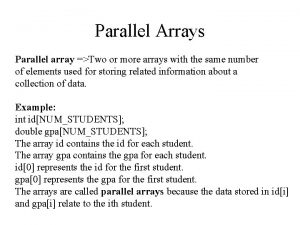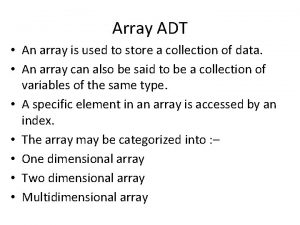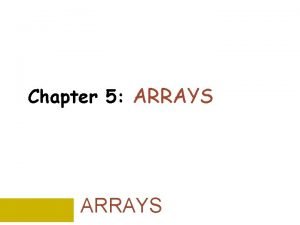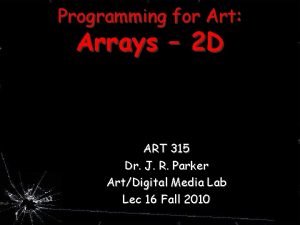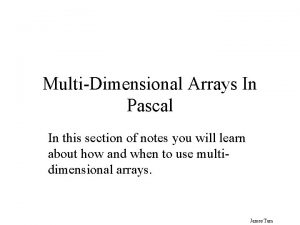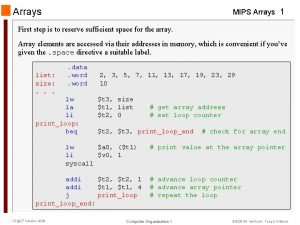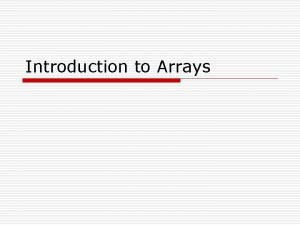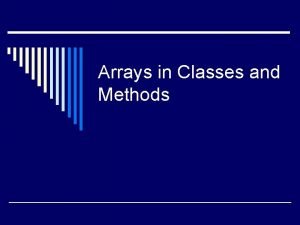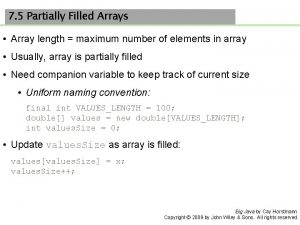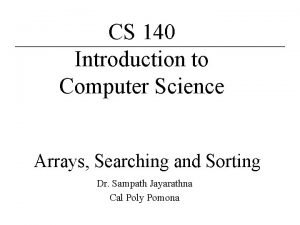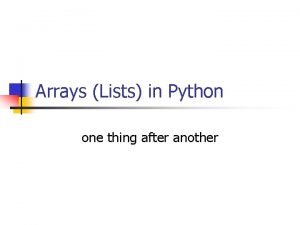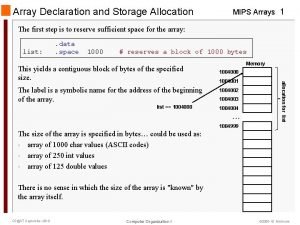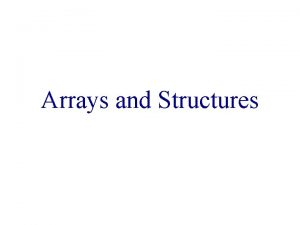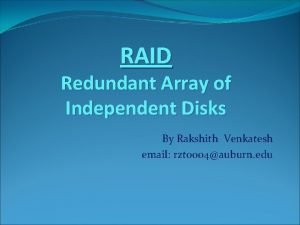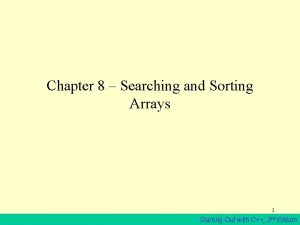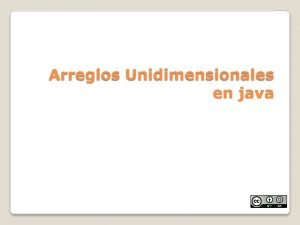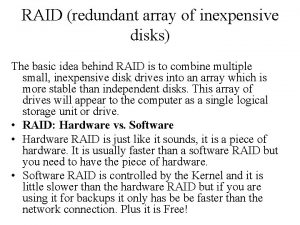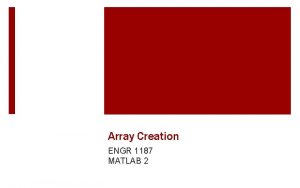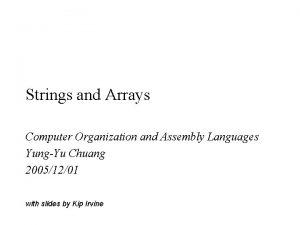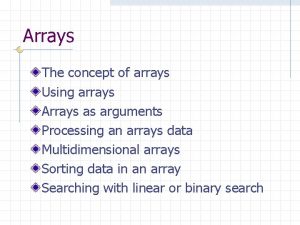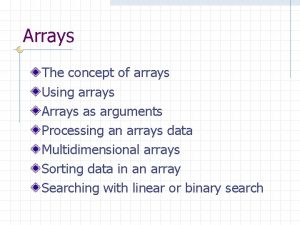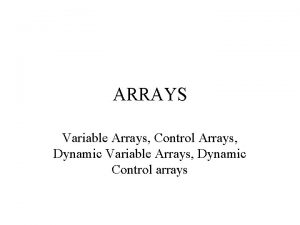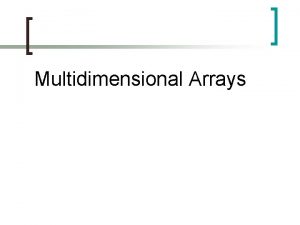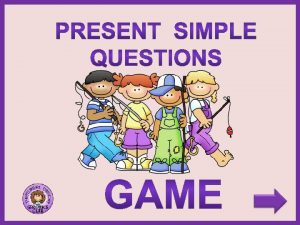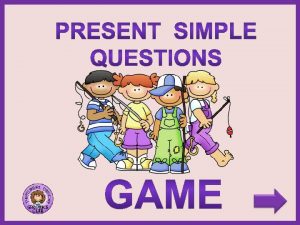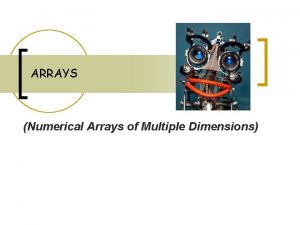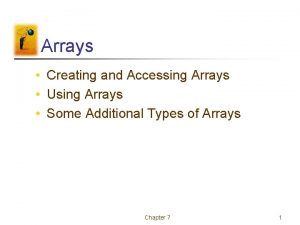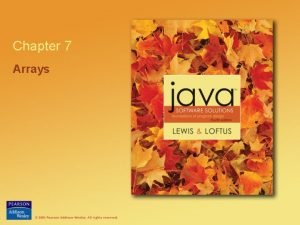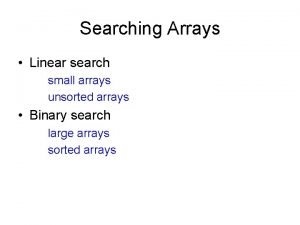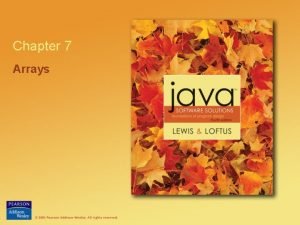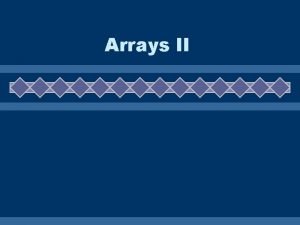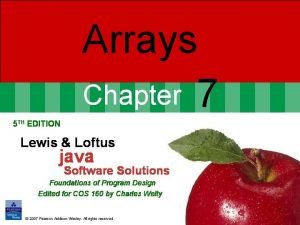Arrays Arrays What good are they Arrays are


![Arrays § Declaration § § Initialization § § <data type>[ ] <name>; <name> = Arrays § Declaration § § Initialization § § <data type>[ ] <name>; <name> =](https://slidetodoc.com/presentation_image_h2/aaab9e0a931a16ce1d04da562c7c1829/image-3.jpg)




![Arrays § How do we index (access) the individual ellements? alphabet[0] a b c Arrays § How do we index (access) the individual ellements? alphabet[0] a b c](https://slidetodoc.com/presentation_image_h2/aaab9e0a931a16ce1d04da562c7c1829/image-8.jpg)
![Arrays § How do we index (access) the individual ellements? alphabet[0] alphabet[1] a b Arrays § How do we index (access) the individual ellements? alphabet[0] alphabet[1] a b](https://slidetodoc.com/presentation_image_h2/aaab9e0a931a16ce1d04da562c7c1829/image-9.jpg)
![Arrays § How do we index (access) the individual ellements? alphabet[0] alphabet[1] alphabet[25] a Arrays § How do we index (access) the individual ellements? alphabet[0] alphabet[1] alphabet[25] a](https://slidetodoc.com/presentation_image_h2/aaab9e0a931a16ce1d04da562c7c1829/image-10.jpg)
![Arrays § These are the indices alphabet[0] alphabet[1] alphabet[25] a b c d e Arrays § These are the indices alphabet[0] alphabet[1] alphabet[25] a b c d e](https://slidetodoc.com/presentation_image_h2/aaab9e0a931a16ce1d04da562c7c1829/image-11.jpg)

![Arrays – What good are they? § Example: int[ ] test. Grade = new Arrays – What good are they? § Example: int[ ] test. Grade = new](https://slidetodoc.com/presentation_image_h2/aaab9e0a931a16ce1d04da562c7c1829/image-13.jpg)



![Arrays – Objects § Using: § § § String[ ] names = new String[9]; Arrays – Objects § Using: § § § String[ ] names = new String[9];](https://slidetodoc.com/presentation_image_h2/aaab9e0a931a16ce1d04da562c7c1829/image-17.jpg)
![Arrays – Objects § String[ ] names = new String[9]; names null null null Arrays – Objects § String[ ] names = new String[9]; names null null null](https://slidetodoc.com/presentation_image_h2/aaab9e0a931a16ce1d04da562c7c1829/image-18.jpg)
![Arrays – Objects § String[ ] names = new String[9]; names[0] = new String(“Gil”); Arrays – Objects § String[ ] names = new String[9]; names[0] = new String(“Gil”);](https://slidetodoc.com/presentation_image_h2/aaab9e0a931a16ce1d04da562c7c1829/image-19.jpg)
![Arrays – Objects § String[ ] names = new String[9]; names[0] = new String(“Gil”); Arrays – Objects § String[ ] names = new String[9]; names[0] = new String(“Gil”);](https://slidetodoc.com/presentation_image_h2/aaab9e0a931a16ce1d04da562c7c1829/image-20.jpg)
![Arrays – Objects § String[ ] names = new String[9]; names[0] = new String(“Gil”); Arrays – Objects § String[ ] names = new String[9]; names[0] = new String(“Gil”);](https://slidetodoc.com/presentation_image_h2/aaab9e0a931a16ce1d04da562c7c1829/image-21.jpg)
![Arrays – Objects § String[ ] names = new String[9]; names[0] = new String(“Gil”); Arrays – Objects § String[ ] names = new String[9]; names[0] = new String(“Gil”);](https://slidetodoc.com/presentation_image_h2/aaab9e0a931a16ce1d04da562c7c1829/image-22.jpg)
![Arrays – Objects § String[ ] names = new String[9]; names[0] = new String(“Gil”); Arrays – Objects § String[ ] names = new String[9]; names[0] = new String(“Gil”);](https://slidetodoc.com/presentation_image_h2/aaab9e0a931a16ce1d04da562c7c1829/image-23.jpg)
















- Slides: 39

Arrays

Arrays – What good are they? § § § Arrays are a list of data They are very good at storing a number of variables of the same data type. These can be of any data type, primitive or reference
![Arrays Declaration Initialization data type name name Arrays § Declaration § § Initialization § § <data type>[ ] <name>; <name> =](https://slidetodoc.com/presentation_image_h2/aaab9e0a931a16ce1d04da562c7c1829/image-3.jpg)
Arrays § Declaration § § Initialization § § <data type>[ ] <name>; <name> = new <data type>[<size>]; Data type can be primitive or reference § § char[ ] alphabet; alphabet = new char[26];

Arrays § § Arrays are objects in java They have methods like to. String( ) and data members like length They are special objects, and like strings have a number of ways they can be initialized: alphabet = {‘a’, ‘b’, ‘c’, …, ‘y’, ‘z’};

Arrays § What does this look like in memory?

Arrays § What does this look like in memory? alphabet a b c d e f g : : y z

Arrays § How do we index (access) the individual ellements? alphabet a b c d e f g : : y z
![Arrays How do we index access the individual ellements alphabet0 a b c Arrays § How do we index (access) the individual ellements? alphabet[0] a b c](https://slidetodoc.com/presentation_image_h2/aaab9e0a931a16ce1d04da562c7c1829/image-8.jpg)
Arrays § How do we index (access) the individual ellements? alphabet[0] a b c d e f g : : y z
![Arrays How do we index access the individual ellements alphabet0 alphabet1 a b Arrays § How do we index (access) the individual ellements? alphabet[0] alphabet[1] a b](https://slidetodoc.com/presentation_image_h2/aaab9e0a931a16ce1d04da562c7c1829/image-9.jpg)
Arrays § How do we index (access) the individual ellements? alphabet[0] alphabet[1] a b c d e f g : : y z
![Arrays How do we index access the individual ellements alphabet0 alphabet1 alphabet25 a Arrays § How do we index (access) the individual ellements? alphabet[0] alphabet[1] alphabet[25] a](https://slidetodoc.com/presentation_image_h2/aaab9e0a931a16ce1d04da562c7c1829/image-10.jpg)
Arrays § How do we index (access) the individual ellements? alphabet[0] alphabet[1] alphabet[25] a b c d e f g : : y z
![Arrays These are the indices alphabet0 alphabet1 alphabet25 a b c d e Arrays § These are the indices alphabet[0] alphabet[1] alphabet[25] a b c d e](https://slidetodoc.com/presentation_image_h2/aaab9e0a931a16ce1d04da562c7c1829/image-11.jpg)
Arrays § These are the indices alphabet[0] alphabet[1] alphabet[25] a b c d e f g : : y z

Arrays § The index to an array can be any expression as long as it is within the valid range: § § § alphabet[0] alphabet[2*7] alphabet[x*y+2] alphabet[(int) Math. rand()*25] The only problem occurs if the index is § § Less than 0 Greater than or equal to the length
![Arrays What good are they Example int test Grade new Arrays – What good are they? § Example: int[ ] test. Grade = new](https://slidetodoc.com/presentation_image_h2/aaab9e0a931a16ce1d04da562c7c1829/image-13.jpg)
Arrays – What good are they? § Example: int[ ] test. Grade = new int[9]; for(int i = 0; i < test. Grade. length; i++) test. Grade[i] = in. Box. get. Integer( “Enter test score for student” + i); Notice length is a public data member, not a method!

Arrays – What good are they? § Example: double average = 0; for(int i = 0; i < test. Grade. length; i++) average += test. Grade[i]; average = average / test. Grade. length; System. out. println(“Test Average: ” + average); Notice length is a public data member, not a method!

Arrays – What good are they? § Questions? ? ?

Arrays – Objects § § Arrays of Objects are just as useful as arrays of primitives They are declared and initialized the exact same way: String[ ] names = new String[9]; String[ ] names = {“Katie”, “Andy”, “Gil”};
![Arrays Objects Using String names new String9 Arrays – Objects § Using: § § § String[ ] names = new String[9];](https://slidetodoc.com/presentation_image_h2/aaab9e0a931a16ce1d04da562c7c1829/image-17.jpg)
Arrays – Objects § Using: § § § String[ ] names = new String[9]; Initially, all elements are null Each element must be defined
![Arrays Objects String names new String9 names null null null Arrays – Objects § String[ ] names = new String[9]; names null null null](https://slidetodoc.com/presentation_image_h2/aaab9e0a931a16ce1d04da562c7c1829/image-18.jpg)
Arrays – Objects § String[ ] names = new String[9]; names null null null
![Arrays Objects String names new String9 names0 new StringGil Arrays – Objects § String[ ] names = new String[9]; names[0] = new String(“Gil”);](https://slidetodoc.com/presentation_image_h2/aaab9e0a931a16ce1d04da562c7c1829/image-19.jpg)
Arrays – Objects § String[ ] names = new String[9]; names[0] = new String(“Gil”); names[0] Gil null null
![Arrays Objects String names new String9 names0 new StringGil Arrays – Objects § String[ ] names = new String[9]; names[0] = new String(“Gil”);](https://slidetodoc.com/presentation_image_h2/aaab9e0a931a16ce1d04da562c7c1829/image-20.jpg)
Arrays – Objects § String[ ] names = new String[9]; names[0] = new String(“Gil”); names[8] = “Phil”; names[8] Gil null null Phil
![Arrays Objects String names new String9 names0 new StringGil Arrays – Objects § String[ ] names = new String[9]; names[0] = new String(“Gil”);](https://slidetodoc.com/presentation_image_h2/aaab9e0a931a16ce1d04da562c7c1829/image-21.jpg)
Arrays – Objects § String[ ] names = new String[9]; names[0] = new String(“Gil”); names[8] = “Phil”; for(int i=1; i<8; i++) names[i] = alphabet[i] + “il”; names[8] Gil null null bil Phil
![Arrays Objects String names new String9 names0 new StringGil Arrays – Objects § String[ ] names = new String[9]; names[0] = new String(“Gil”);](https://slidetodoc.com/presentation_image_h2/aaab9e0a931a16ce1d04da562c7c1829/image-22.jpg)
Arrays – Objects § String[ ] names = new String[9]; names[0] = new String(“Gil”); names[8] = “Phil”; for(int i=1; i<8; i++) names[i] = alphabet[i] + “il”; names Gil names[8] null null bil cil Phil
![Arrays Objects String names new String9 names0 new StringGil Arrays – Objects § String[ ] names = new String[9]; names[0] = new String(“Gil”);](https://slidetodoc.com/presentation_image_h2/aaab9e0a931a16ce1d04da562c7c1829/image-23.jpg)
Arrays – Objects § String[ ] names = new String[9]; names[0] = new String(“Gil”); names[8] = “Phil”; for(int i=1; i<8; i++) names[i] = alphabet[i] + “il”; This would eventually initialize all the elements. names Gil names[8] null null bil cil Phil

Arrays – Objects § § Elements must be initialized before they can be used After an element has been initialized, they can be used just like regular variables: § § names[1]. equals(names[7]); System. out. println(names[5] + “received a grade of “ + alphabet[0]);

Arrays – Objects § Questions? ? ?

Arrays § § Exercise: Write a code segment that: § § declares a String array of size 10 Initializes it with 10 Strings entered by the user (hint: use an Input. Box) Prints the string with the smallest length Prints the string with the max length

Arrays § § § Removing objects from arrays: You can simply replace it with a new object names[0] = new String(“Gil 2”); names[0] Gil null null Gil 2

Arrays § Also like other objects, two elements can point to the same object § names[0] = “Moe”; names[1] = names[0]; § names[0] Moe null null

Arrays § § § Just like regular objects, you can pass and return arrays to and from methods example. method 1(squares); public void method 1(int[ ] pattern){ // do something here } squares 1 2 4 9 16 25 36 49 64

Arrays § § § Just like regular objects, you can pass and return arrays to and from methods example. method 1(squares); public void method 1(int[ ] pattern){ // do something here } squares pattern 1 2 4 9 16 25 36 49 64

Arrays § § § Just like regular objects, you can pass and return arrays to and from methods example. method 1(squares); public void method 1(int[ ] pattern){ // do something here } pattern[0] == squares[0] true pattern[1] == squares[1] true pattern ? = squares pattern 1 2 4 9 16 25 36 49 64

Arrays § § § Just like regular objects, you can pass and return arrays to and from methods example. method 1(squares); public void method 1(int[ ] pattern){ // do something here } pattern[0] == squares[0] true pattern[1] == squares[1] true pattern == squares true squares pattern 1 2 4 9 16 25 36 49 64

Arrays § Just like regular objects, you can pass and return arrays to and from methods § example. method 1(names); § public void method 1(String[ ] people){ // do something here } names null null Moe

Arrays § Just like regular objects, you can pass and return arrays to and from methods § example. method 1(names); § public void method 1(String[ ] people){ // do something here } names people null null Moe

Arrays § Just like regular objects, you can pass and return arrays to and from methods § example. method 1(names); § public void method 1(String[ ] people){ // do something here } people[1]. equals(names[1]) people[1] == names[1] people == names people null null Moe

Arrays § Just like regular objects, you can pass and return arrays to and from methods § example. method 1(names); § public void method 1(String[ ] people){ // do something here } people[1]. equals(names[1]) true people[1] == names[1] people == names people null null Moe

Arrays § Just like regular objects, you can pass and return arrays to and from methods § example. method 1(names); § public void method 1(String[ ] people){ // do something here } people[1]. equals(names[1]) true people[1] == names[1] true people == names people null null Moe

Arrays § Just like regular objects, you can pass and return arrays to and from methods § example. method 1(names); § public void method 1(String[ ] people){ // do something here } people[1]. equals(names[1]) true people[1] == names[1] true people == names true names people null null Moe

Arrays § Questions? ?
 Insidan region jh
Insidan region jh You are good you are good when there's nothing good in me
You are good you are good when there's nothing good in me Good thoughts good deeds good actions
Good thoughts good deeds good actions Buenas tardes
Buenas tardes B. good evening
B. good evening Good afternoon teacher
Good afternoon teacher If your conditions are competitive we (place)
If your conditions are competitive we (place) Grammar rules frustrate me they're not logical they are so
Grammar rules frustrate me they're not logical they are so They seek him here they seek him there
They seek him here they seek him there For they not know what they do
For they not know what they do Because you have rejected me i have rejected you
Because you have rejected me i have rejected you Although they knew god they did not glorify him
Although they knew god they did not glorify him Rankings: what are they and do they matter?
Rankings: what are they and do they matter? They are they which testify of me
They are they which testify of me Parallel arrays
Parallel arrays Adt of array
Adt of array Global arrays in c
Global arrays in c Why do we need arrays?
Why do we need arrays? Arrays
Arrays 2d array pascal
2d array pascal Mips array example
Mips array example Java array operations
Java array operations Facts about arrays
Facts about arrays Advantages of static memory allocation
Advantages of static memory allocation Partially filled array
Partially filled array Computer science arrays
Computer science arrays Python parallel arrays
Python parallel arrays Dynamic arrays and amortized analysis
Dynamic arrays and amortized analysis Day 3: arrays
Day 3: arrays Mips array example
Mips array example Polynomial representation using array in c
Polynomial representation using array in c 潘仁義
潘仁義 Redundant arrays of independent disks
Redundant arrays of independent disks Advantages and disadvantages of array over linked list
Advantages and disadvantages of array over linked list Searching and sorting arrays in c++
Searching and sorting arrays in c++ Arreglos unidimensionales en java ejemplos
Arreglos unidimensionales en java ejemplos Microled arrays
Microled arrays A case for redundant arrays of inexpensive disks
A case for redundant arrays of inexpensive disks Creating arrays matlab
Creating arrays matlab Strings in assembly language
Strings in assembly language














